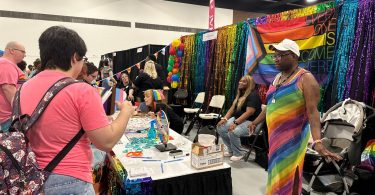8 trans teens get real on what it’s really like growing up in America From testosterone battles to museum dreams, Nico Lang’s new book reveals trans youth resilience amid legislative storm. (Getty Images/Getty Images)
Trans youth across the nation are fighting for their rights, and Nico Lang wishes this wasn’t the case.
Legislation against the LGBTQ community—young trans people in particular—has been skyrocketing since 2019. This year alone has seen an unprecedented surge: 658 bills were introduced in state legislatures aiming to restrict the rights of trans youth nationwide, with 45 of these bills having passed into law.
These laws cover a wide range of issues, from banning gender-affirming care for minors to restricting bathroom usage based on gender identity. Some prohibit trans athletes from participating in sports teams aligning with their gender identity, while others censor LGBTQ+ topics in schools.
The impact of these laws is far-reaching. In states where gender-affirming care has been banned, trans youth may face increased risks of depression, anxiety, and suicidal ideation. According to a 2022 Trevor Project survey, 93% of transgender and nonbinary youth said they have worried about trans people being denied access to gender-affirming medical care due to state or local laws.
Additionally, an anticipated Supreme Court case, “U.S. v. Skrmetti,” hinges on Tennessee’s Senate Bill 1, which passed into law in July 2023, banning gender-affirming care for minors. The case will bring clarity to whether the Constitution protects individuals regarding “gender identity,” potentially setting a precedent for similar laws nationwide.
It’s against this backdrop that Lang, founder of Queer News Daily and an award-winning journalist whose work has appeared in Rolling Stone, The New York Times, The Guardian and more, is debuting their largest project yet: a book.
“American Teenager” follows the lives of eight trans and nonbinary youth, chronicling their struggles, triumphs, and teenhood. This story falls on the heels of the rising anti-transgender movement from far-right conservatives who seek to ban gender-affirming care, bathroom access, LGBTQ books, sports participation and much more.
“These young people have truly witnessed the unimaginable, and they have done it with a grace I did not possess when I was that young,” Lang, who is nonbinary, said, describing the rise of young trans advocates largely as an urgent trauma response. “They have been forced to grow up too fast against their will, and they have learned too many hard lessons too young. No child should have to be so grown up. No child should be teaching me how to be strong.”
Through writing the book, Lang had to come to terms with one unexpected subject: themself. Having lost their mother in 2016 abruptly one week after her sudden brain aneurysm, Lang tells Reckon that, like the teens in the book, family can be redefined and rebuilt.
“Writing this book helped me come to terms with how much I still missed my mother—the person most like me in the world—and how much I always will,” they said.
A resilient force fighting for a better Alabama
To this day, Rhydian Gonzalez still hangs onto his empty testosterone bottles.
One of Lang’s subjects in the book, Gonzalez of Birmingham, Ala. tells Reckon that every once in a while, the pressure of the vial will adjust and he can get half a pump out of it. The 20-year-old is worried his gender-affirming care can be taken away—again.
During his junior year in high school at Magic City Acceptance Academy in 2022, Alabama passed Senate Bill 184, banning “practices to alter or affirm minor’s sexual identity or perception.” He lost his access to his testosterone.
SB 184, also known as the Alabama Vulnerable Child Compassion and Protection Act, made it a felony for medical professionals to provide gender-affirming care to individuals under 19, punishable by up to 10 years in prison. The law’s impact extended far beyond Gonzalez, who despite having parents who stayed up late after work educating themselves on trans issues by watching Jamie Dodger, a trans YouTuber and commentator on LGBTQ issues, was distraught by the state of his government.
“It was miserable—I got my period again,” he said. “I was just really frustrated and felt like nothing more than a chess piece, being moved around for political reasons.”
Alabama faces only six anti-trans bills this year, as it did in 2023 and 2022. But SB 184 was enough for Gonzalez to find a purpose in his future. Today, as a sophomore at the University of Alabama at Birmingham, he is studying criminal justice.
“Seeing the legal issues arise in regards to systematic oppression and the way that things are not fair, especially here in the U.S., I want to try and make things a little bit more fair and help people if I can,” he said.
SB 184 was blocked for its unconstitutionality shortly after, and it wasn’t long before he turned 18. Conservative politics aside, he describes his Alabama as being resilient, tough and brave.
“I think because of the way that our state has treated us, we have become very good at advocating for ourselves, and I think that’s a beautiful thing.”
Hustling in Texas
In Houston, Texas, Ruby really wants to work with a museum or an art gallery, putting her art history knack to use in management or curation.
Another subject of “American Teenager,” Ruby is a 21-year-old bisexual trans woman who was still a teen during Lang’s stay with her family. Her life is hectic, but apart from her gender identity. She works three jobs: as an office assistant for a custom suit maker Monday through Thursday, working as a clerk at a law firm on Fridays, all while part-time studying art history at Houston Community College.
“I love the physical building of a museum or a gallery as much as I love the art itself because I think that’s also how an exhibit is curated,” she said. “As a society, how we tell the stories of the people from the past helps us learn about our present.”
Ruby’s present has her living in Houston since last year, but she grew up with a loving family and an Episcopalian church community in Cypress, Texas. As it pertains to the state overall, “we have a complicated relationship,” she said.
Despite having a fairly uneventful upbringing, her home state is nothing short of eventful. Last year, Texas took the lead in introducing the highest number of anti-trans bills, at 69, compared to the rest of the country, which saw a total of 615.
Ruby didn’t come out until she was 17 in 2020, but the Trump presidency had already shown her how conservative her state was regarding pro-trans advocacy.
“Mainly what I get is a sense of betrayal from Texas,” she said, noting that her family has been in the state for five to six generations. “And now politicians have decided that it’s lucrative to attack me.”
Between her family and the church, her protective bubble was unwavering. Ruby herself describes it as “fucking awesome.” She says that as a white trans woman, she isn’t acquainted with racial injustices, and therefore sees her experience of transphobia as a Russian roulette of sorts, never knowing if people will accept her gender identity.
In the book, Lang is staying with Ruby’s family during the spring of 2022. Ruby was still in high school, living with her family in Cypress and experiencing dating her first boyfriend.
“I look back on those memories fondly. I [had] felt so undesirable and ugly, not just romantically, but in friendships and by society. To be affirmed [by a relationship] was really big for me, because I never thought that I would have that. It gave me a lot of confidence.”
Despite Ruby’s loving upbringing, she still feels nervous in anticipation of the book release because letting people into her life feels intimate, potentially opening herself up for criticism and input.
Today, the Texas Republican platform is running off banning gender-affirming care through age 26. If that passes, Ruby will need her medication shipped from out of state, or she will have to move “because there’s no life for me without my care,” she said.
In the meantime, she’s soaking up being 21.
“It’s such a fun age. One of our customers at the suit shop said he had some contacts on the board of the Museum of Fine Arts, and he might be able to hook me up. I’m enjoying life in ways that I never enjoyed before.”
A picture-perfect family in South Dakota
The structure of family, for 17-year-old Wyatt Williams, is quite simple: his dad has an affinity for saying quips that sound like they’re from old TV shows, and his mom bakes sweet treats when he’s having a bad day.
Williams, also in “American Teenager,” is from Sioux Falls, S.D., located in the southwestern corner of the state where nature thrives where it is deemed blue in a sea of red political rhetoric. He currently lives in Chicago, studying at the School of the Art Institute of Chicago in hopes of becoming a writer.
When he was 10, he wrote his parents an eight-page, single-spaced letter detailing that he is a boy. Despite being a well-rounded child, Williams threw tantrums when needing to wear dresses or participate in girls-only activities. A Christian counselor with a spiritual and holistic approach had told his parents that he might have gender dysphoria.
Williams’ mom was quick to jumpstart the action after he wrote them the letter: She read 20 books about being trans, started a support group for other parents of trans children in South Dakota, shepherding herself into the world of activism. While the counselor has now passed away, Williams feels deep gratitude for her care.
But the state at large was contributing to his feelings of betrayal, taking away all trans healthcare for kids when the governor signed House Bill 1080 into law last year. South Dakota remains to be one of the states with very few anti-trans bills, though HB 1080 proves that the urgency is in the governor’s signage.
Now in Chicago, Williams is caught between missing his family back home and wanting better for his trans counterparts of the state—many of whom have turned to his mother for education and advocacy.
“It’s never fun to hear your home sort of bashed because of legislation, but that’s something I’ve dealt with a lot. South Dakota is this wonderful home that sure gets a little too cold in the winter, but it’s incredibly beautiful in so many ways.”
Williams, Ruby and Gonzalez take readers of “American Teenager” into the nuanced lives of young trans people who simply want to enjoy being teenagers. For Lang, the book required all of the tools they garnered after a decade of LGBTQ reporting.
“I had to be an active listener, a part-time social worker, a skilled observer, a trustworthy confidant, a community builder, and an organizer, in addition to many other roles that I didn’t foresee for myself,” they said. “There was nothing left on the table, and I hope that readers see my heart and soul in the prose.”
Lang says they will probably be in therapy for years unpacking the secondary trauma from witnessing intense emotions on behalf of the families they visited. One in particular stands out: a trans girl named Jack, who was forced to detransition in Florida as a result of the state taking away her Medicaid’s coverage of gender-affirming care.
They describe the helplessness she felt as she witnessed the changes in her body without hormones as something that will stay with them forever. Ultimately, “American Teenager” is a culmination of Lang’s labor and trust in the trans community as much as it is about teens fighting to be teens.
“This book is about these kids, and it’s their voices that are paramount,” Lang said. “I gave away so much of myself, even in the way I wrote it, that it feels incredibly vulnerable. I’m glad for that, but I’d be lying if I didn’t say that it feels very nervous. We all put a lot of ourselves [into writing the] book, and I hope that’s received well. I hope people recognize that.”







